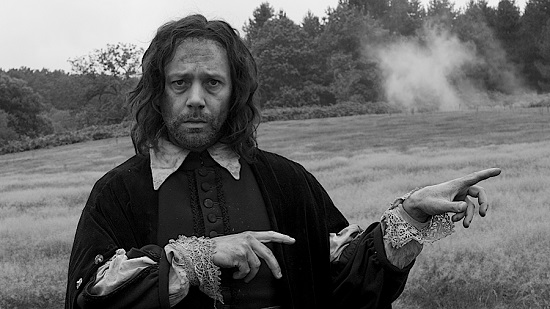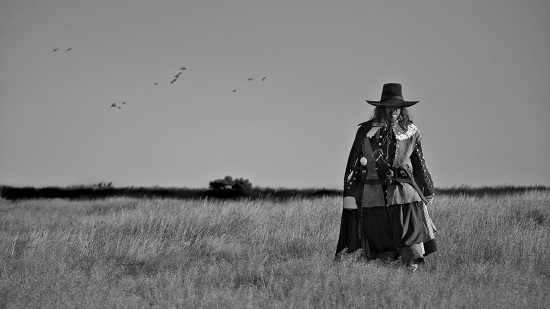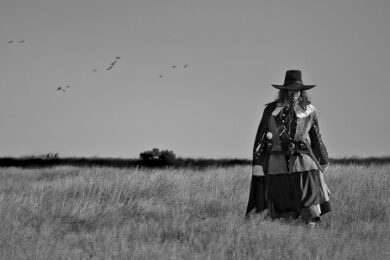The English countryside has been the inspiration to dreamers, poets, shamans and charlatans for centuries. You can draw a ley line between all those inspired and maddened by its beauty. From the apocalyptic rantings of David Tibet to Vaughan William’s Lark Ascending. Hacker Farm’s noisy re-appropriations of rural detritus to poor John Clare’s lunatic ramble toward his long-dead sweetheart. It is the seat of the English visionary tradition, and there has always been something about its untamed landscape that makes a suitable backdrop for stories that tap into the dormant, darker parts of the subconscious. Following this long line is the latest film from the director of Sightseers and Kill List, Ben Wheatley.
A Field In England tells the story of a group of soldiers (played by Reece Shearsmith and Julian Barratt amongst others) deserting from the tumult of the English Civil War and captured by an alchemist (Michael Smiley) who forces them into a hunt for a buried treasure. This simple set-up becomes the backdrop for one of the most powerfully hallucinatory film experiences since the days of Roeg and Jodorowsky. A Field In England is a head movie in the hardest sense, as it harnesses all the power at its disposal to baffle, blind and batter the audience into an altered state.
What was it that made you want to set a film during the English Civil War?
Ben Wheatley: I’d been making short films that had just been people in rooms and I wanted to do something on a bigger scale, so I thought I’d do a documentary about battle re-enactment. My secret agenda being to get to work with large amounts of people. I got in touch with the Sealed Knot who are the English Civil War re-enactment lot and started going to their events. It had always been in the back of my head to make something about the Civil War. It just seemed like such an interesting period because it’s the beginning of the Western world. They’d got rid of a king and parliament’s powers were increased and magic was turning into science. It’s a very messy period. But the amount of thought going on in the country at that point – everybody radicalised and marching and starving and not knowing what’s going on – was fantastic.
And you use that period as the basis for what is basically a trip movie. What made you want to combine the two things?
BW: Just reading about it. We read about the magic men going about blowing ground-up mushroom dust into people’s faces and people having experiences. That was really interesting. And we read about mushroom circles and how they were considered to be portals to fairy worlds and how if you went through one it was very difficult to escape. How time moves at different speeds either side of the mushroom circle and that you need four men and a rope to pull you out…
Oh, that’s where that bit came from!
BW: It just jumps off the page. You’re going “Fuck! That’s brilliant!” But also on a very basic level we wanted to make a midnight movie. Those kind of movies that haven’t been made for donkeys years, like Eraserhead, where you end up going, “This is wilfully strange”. It’s a trip movie, basically. In the same way that people flogged 2001 as one. It’s a sensory experience as much as it is a story. That was important.
Certainly the trippiness felt very familiar to me. It doesn’t have that cosmic, expansive 2001 vibe. It has a grainy, detailed feel that I associate with English magic mushrooms. I mean, I wouldn’t want to speculate on how “experienced” you are…
BW: [laughs] Yeah, your perception is so fucked on mushrooms. We found in the editing of the trip sequence – where it’s cross-cutting between two similar images – that it makes your brain kind of split in half as you try to process the two images at the same time. That felt to me like an experience I’ve had on mushrooms. It had that intensity. You don’t necessarily see lots of surreal things, but your perception is fucked. I think that’s what comes across. And of course it’s a device in the film for bringing across lots of different ideas and putting them on top of each other as the character of Whitehead [Shearsmith] works out who’s who and what’s what. It’s a remix of the movie you’ve been seeing, but at the same time it’s an audio and visual assault on you. I don’t know why more cinema isn’t like that.

The only film I can think of recently that’s gone for that intensity has been Valhalla Rising.
BW: Enter The Void as well.
It managed to keep a very tight storyline going throughout. Were you ever worried about the trippiness of the film getting in the way of the story’s clarity?
BW: Not really. It’s the first film that we’ve done that’s not got any improvisation in it. It’s got pretty much one line of improvisation and other than that everything is exactly as scripted. That comes from two things. One is that we shot it fast, 12 days, so there’s not a lot of time for pissing about. And the other thing is it’s very difficult for actors to improvise in period dialogue. As soon as you get them to go off the script it just turns into normal English. We had nightmares over the dialogue and I’m sure we got tons of it wrong. One of the characters uses the word ‘envelope’ which we found out doesn’t get into the dictionary until about three years after the Civil War. You’re like, “Oh, they didn’t have envelopes before that?” But of course, there was no postal service. We figured that these words are sometimes in usage before they’re in the dictionary.
There’ll be one history professor pushing his glasses up his nose and harrumphing…
BW: Oh, there’ll be loads. It is difficult. We’ve done due diligence, but we’re not historians.
There’s a real pleasure in language in the film as well. I felt like I’d waited most of my life to hear Julian Barrett use the word ‘homunculus’…
BW: It’s a beautiful script. It’s slightly embarrassing, but I was still coming to understand it as I was making the film. There are bits of the script almost talking to each other as the film goes on. Amy [Jump, scriptwriter] did a brilliant job on it.
There’s a lot more in the film about class than I was expecting. You’ve got educated characters and less educated characters but all of them are still quite ignorant. They don’t really know what’s going on.
BW: I really like the bit when Whitehead’s talking to Friend [Richard Glover] and giving him his CV and putting on a weird posh accent that he didn’t have before. That is what the film is trying to get at; that someone like O’Neill [Smiley] could have come out of that field and run the country. In that period there were a lot of these characters. Cromwell wasn’t the person most expected to rise up through the ranks. It was all a bit random what happened. I like the idea of anarchic and creative characters thinking and having plans. If you’ve got a bit of tangential thought you can move very quickly through society, but having that kind of idea is very hard. If you look at the movies I’ve done they tend to revolve around those types of characters. Sightseers is like that as well.
It’s a fantastic sounding film. It’s rare enough in a movie that someone turns to the camera and starts singing a song, but mixing that with the heavy synth drones…
BW: There are a couple of things going on with it. The general thinking was that it should go from a traditional type of music to more psychedelic – “We’ll start here and we’ll end up here” – and that on the way it should go through Morricone, because the film basically becomes a cowboy movie. The main theme to me is like Jim Williams [composer] channelling Morricone, and there’s versions of that tune that go all the way through the film. I’d found the lyrics to ‘Ballou My Boy’, which is the song that Richard Glover sings to camera, and then Jim had found some orchestration to it, but he said it was very complicated and so he rewrote it to make it sound a little less hey-nonny-nonny. We wanted the first part of the film to be soundtracked by music the characters could have played if they’d had an instrument. Stuff they they could just about knock out and sing. Until comparatively recently, in the last couple of hundred years, you’d have to make your own entertainment. That’s what that singing is. He’s the radio basically. He sings his song and the rest of them are like…
The other character’s reactions to him are very interesting.
BW: They’ve heard that song a lot by that point.
Not to give too much away, but just after Whitehead’s experience in the tent there’s that almost Popol Vuh-esque keyboard drone…
BW: That’s ‘Chernobyl’ by Blanck Mass, the only bit of licensed music in the film. I was editing every night in the hotel and we were looking at this long take going, “Fuck, this is fantastic, but what music can go with it?” Andy Stark, the producer, is a big music fan and he put that track on over the footage and we just went [gasps sharply] and had to go and pursue them. The budget was so small that one of the agreements I’d made was that I wouldn’t put any licensed music on it because we couldn’t afford to, but Blanck Mass were really good about it.
There’s a milieu which the film references. That Weird English Cinema that includes films like Witchfinder General…
BW: Or Winstanley, or Culloden. I’d seen Winstanley, which is a great film, but not an easy one to reference. Witchfinder General not so much, to be honest. I think the thing that maybe carries through is the cowboy-ness of it. Witchfinder… is basically a Western. But we found that that snuck up on us. It wasn’t planned. Once we saw the actors lurching about in the hats with the guns we realised that these characters would have been the same guys that would have had to run off to America to escape persecution. I can’t deny that there are references in the movies, but it’s not like I put it in there to see if people can spot it. It’s more that it just comes out in the general wash. Then you see it in the edit and you think “ah…”
The use of tableau to break the acts up was very interesting.
BW: That was always in the script. It came out of looking at the pamphlets that were going around in the period and the very flat pictorial representation in them. The idea developed out of that. We thought about having drawings to represent those moments, but Amy said we should get them to pose on camera. What we wanted it to look like was a language of film-making that might have existed before film. That’s why we used a lot of weird camera lenses as well.
Giving it a kind of deliberately uneven quality?
BW: Yeah, and the fast cutting as well. We were trying to sit a little outside of the language of normal cinema.

You shot the film very quickly – 12 days. Are you a fan of that pulp ideal? Of getting the ideas across hard and fast?
BW: If I could have got away with no one knowing how fast it was shot I would have been happy. It was blurted out by someone right at the beginning of the whole process. It’s not an issue. Sometimes you film stuff and it’s too quick and you don’t have time to do it properly, but not this. We never felt that we were up against it, or that we needed more time. Part of the reality of being allowed to do something so out there is that you have to bring it in at a certain budget.
Making something at speed can give it a compellingly urgent quality though.
BW: Shock Corridor was shot in 12 days. A lot of those movies were quick. The Roger Corman films were made really quickly. I don’t think it makes much difference. There can be big sets and a lot of lamp tweaking but it doesn’t help to make the basic movies. If someone said that some of the Bergman films were shot in 12 days you wouldn’t be surprised, would you? It doesn’t matter. I think it’s a shame that it got out, but at the same time all the stuff we’re doing at the moment for the DVD release – the ‘making of’ stuff – is about just that. It’s going, “Look, you can make a movie, it’s not as complicated as you might think.” It’s hard to make the film good, but the mysteries of it are what we’re trying to pull the veil away from.
A Field In England is released in UK nationwide cinemas, on free TV, on DVD and on video-on-demand today



